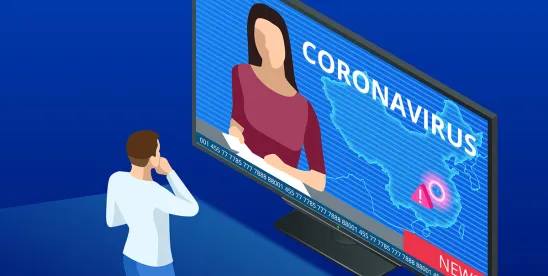The House and Senate returned to Washington July 20, and a second Coronavirus Relief Package is at the top of the agenda. Passed in late May on party-line voting, the House Democrats' HEROES Act would provide over $3.5 trillion in relief. While Senate Democrats tend to favor the HEROES Act or a bill with similar provisions and funding, Senate Republicans are in talks with the White House to aim closer to $1 trillion for a "Phase Four" Coronavirus relief package, which they hope to unveil next week. Senate Appropriations, Finance, HELP and other committees are already drafting legislation behind the scenes so that a bill can be put on the floor as soon as possible. The goal is to get an additional relief package enacted into law before departing for their recess on August 10. Additional items to be considered over the next few weeks include the National Defense Reauthorization Act and Appropriations for the Fiscal Year 2021.
The bill will likely include:
Liability Protection
With bipartisan support, such provisions for businesses, schools, and hospitals will be at the top of the list for debate and inclusion. Senate Majority Leader Mitch McConnell (R-KY) has stated that they will likely start with a plan for these stakeholders to stay insulated from lawsuits retroactive from late 2019 and extending through 2024. Meanwhile, Democrats, while concerned about liability, are also concerned that granting blanket immunity may hurt workers in the long run. In a letter released this morning to his colleagues, Senator Chuck Schumer (D-NY) noted that the Senate Republican bill will include, "…a sweeping new multi-sector corporate immunity proposal that would have federal government preempt the laws of all 50 states and grant legal immunity to negligent corporations, nursing homes or others that fail to take reasonable steps to avoid spreading the virus." The House HEROES Act provides funds for the Occupational Safety and Health Administration (OSHA) for worker protection and to prevent, prepare for, and respond to coronavirus issues.
Restaurant and Hospitality Worker Aid
A bipartisan Senate bill sponsored by Roger Wicker (R-MS) and Kyrsten Sinema (D-AZ) with $120 billion in restaurant industry relief was released in early July, and may be included in the package. Even as restaurants reopen, they will still be losing money because of social distancing measures. Furthermore, many businesses in states that have seen spikes in cases, such as California and Florida, are closing again with no re-open date in sight.
Unemployment Benefits
The CARES Act appropriated an additional $600 per week in unemployment benefits to furloughed and unemployed individuals, a provision that will expire at the end of July. As a priority item for Speaker Pelosi (D-CA) and House Democrats, the HEROES bill extends such unemployment benefits. The flat rate was decided upon because the Department of Labor said it was unable to calculate benefits based on individual salaries. However, this remains a point of partisan contention. Senate Republicans and Treasury Secretary Mnuchin seek to reform this benefit, by decreasing the amount of added unemployment insurance, and providing more incentive to return to work. Officials have proposed a "hiring bonus" for those returning to work. A stimulus check is also likely to be included. The HEROES bill includes a second stimulus bill of the same amount, while Senate Republicans have discussed providing a stimulus bill only for those making less than $40,000/year.
Paycheck Protection Program (PPP) Extension
With PPP set to expire at the end of August, there is partisan disagreement as to extensions and who may benefit from future loans. Treasury Secretary Mnuchin suggested that if an extension is made on the program, it will have to be much more targeted than that of the CARES Act, which came under scrutiny after the disclosure two weeks ago of loan recipients, many of whom are private equity-backed corporations and restaurants; lobbying and law firms; and, hedge funds and investment firms. An estimated five million small businesses have received over $521 billion in forgivable loans from the program. Both parties agree that the small businesses receiving the loans should be those that need them the most.
Funding for Health Care Providers
There is a bipartisan agreement that further health care provider funding is needed. The House Democrats' HEROES bill includes provisions waiving cost-sharing obligations for testing, treatment, and prevention of COVID-19; additional provider relief grants, particularly for hospital reimbursements; billions of dollars in aid for Indian Health Services, Centers for Medicare & Medicaid Services (CMS), Health Resources & Services Administration (HRSA), Substance Abuse and Mental Health Services Administration (SAMHSA), and the CDC, as well as for telehealth expansion; hospital reimbursement changes for Medicare and Medicaid; temporary Medicaid support for states and providers; expansion for access to COBRA; an increase in OSHA standards; and tax deductions for first responders and front-line employees of COVID-19 expenses. The Senate Republicans' bill will focus on liability protection for hospitals and employees; the allocation of the $50 billion remaining in the Provider Relief Fund; funding for mental health and substance abuse providers; and, funding for testing, vaccines, tracing efforts, and providers.
State and Local Government Funding
The CARES Act passed in March provided $150 billion in direct relief, but governors across the country say that money has run dry. The National Governors Associations is urging Congress to deliver over $500 billion in state fiscal relief in the next aid package. Senate Democrats are in favor of additional direct aid for state and local governments, while Republicans tend to favor more indirect aid to schools but less tax relief.
Additional Education and Childcare Funding
K-12, higher education, and childcare systems across the country face an uphill battle in the coming months, both with reopening and safety. The Democrats' House-passed HEROES Act would provide up to $10,000 in student debt relief for more than 20 million federal student loan borrowers, along with provisions for relief in relation to institutional fraud. Those provisions are included in the creation of a $90 billion fund for the Department of Education to support schools; most of these funds would go through the states themselves. The Senate Republican response will likely include less, if any, student loan relief, but will focus more on funding for PPE and precautionary measures.






 />i
/>i

